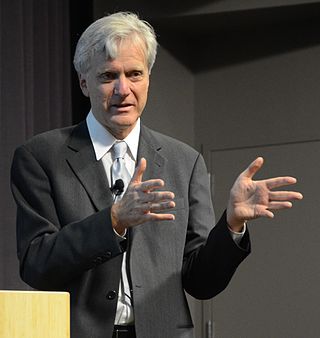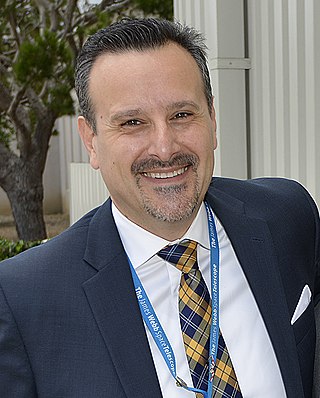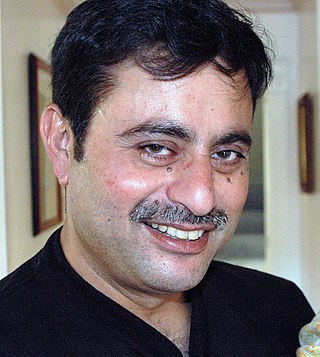Related Research Articles

Craig R. Barrett is an American business executive who served as the chairman of the board of Intel Corporation until May 2009. He became CEO of Intel in 1998, a position he held for seven years. After retiring from Intel, Barrett joined the faculty at Thunderbird School of Global Management in Phoenix.

Sergey Mikhailovich Brin is an American computer scientist and businessman who co-founded Google with Larry Page. He was the president of Google's parent company, Alphabet Inc., until stepping down from the role on December 3, 2019. He and Page remain at Alphabet as co-founders, controlling shareholders and board members. As of December 2024, Brin is the 7th-richest person in the world, with an estimated net worth of $164 billion, according to the Bloomberg Billionaires Index and Forbes.

Andreas Maria Maximilian Freiherr von Mauchenheim genannt Bechtolsheim is a German electrical engineer, entrepreneur and investor. He co-founded Sun Microsystems in 1982 and was its chief hardware designer. As of December 2024, he was 76th wealthiest according to Bloomberg Billionaires Index and Forbes with an estimated net worth of US$26.2 billion.

John Leroy Hennessy is an American computer scientist who is chairman of Alphabet Inc. (Google). Hennessy is one of the founders of MIPS Technologies and Atheros, and also the tenth President of Stanford University. Hennessy announced that he would step down in the summer of 2016. He was succeeded as president by Marc Tessier-Lavigne. Marc Andreessen called him "the godfather of Silicon Valley."

Donald Kennedy was an American scientist, public administrator, and academic. He served as Commissioner of the U.S. Food and Drug Administration (1977–1979), President of Stanford University (1980–1992), and Editor-in-Chief of Science (2000–2008). Following this, he was named president emeritus of Stanford University; Bing Professor of Environmental Science and Policy, emeritus; and senior fellow of the Freeman Spogli Institute for International Studies.
Robert Drost is an American computer scientist. He was born in 1970 in New York City.
Hsiang-Tsung Kung is a Taiwanese-born American computer scientist. He is the William H. Gates professor of computer science at Harvard University. His early research in parallel computing produced the systolic array in 1979, which has since become a core computational component of hardware accelerators for artificial intelligence, including Google's Tensor Processing Unit (TPU). Similarly, he proposed optimistic concurrency control in 1981, now a key principle in memory and database transaction systems, including MySQL, Apache CouchDB, Google's App Engine, and Ruby on Rails. He remains an active researcher, with ongoing contributions to computational complexity theory, hardware design, parallel computing, routing, wireless communication, signal processing, and artificial intelligence.
Brian Keith Reid is an American computer scientist. He developed an early use of a markup language in his 1980 doctoral dissertation. His other principal interest has been computer networking and the development of the Internet.

The President's Council of Advisors on Science and Technology (PCAST) is a council, chartered in each administration with a broad mandate to advise the president of the United States on science and technology. The current PCAST was established by Executive Order 13226 on September 30, 2001, by George W. Bush, was re-chartered by Barack Obama's April 21, 2010, Executive Order 13539, by Donald Trump's October 22, 2019, Executive Order 13895, and by Joe Biden's February 1, 2021, Executive Order 14007.

Alberto Conti, is an astrophysicist and the Vice President and General Manager of the Civil Space Strategic Business Unit (SBU) at BAE Systems Inc.. He is one of the creators of the GoogleSky concept, of the idea of astronomical outreach at South by SouthWest 2013 and of the James Webb Space Telescope iBook. He is also the Executive Producer of the Emmy Winning CNN Films The Hunt for Planet B.

Rajeev Motwani was an Indian-American professor of computer science at Stanford University whose research focused on theoretical computer science. He was a special advisor to Sequoia Capital. He was a winner of the Gödel Prize in 2001.
Joseph Wilfred Goodman is an American electrical engineer and physicist.
Christopher T. Walsh was a Hamilton Kuhn professor of biological chemistry and pharmacology at Harvard Medical School. His research focused on enzymes and enzyme inhibition, and most recently focused on the problem of antibiotic resistance. He was elected to the National Academy of Sciences in 1989.

John Mathew Cioffi is an American electrical engineer, educator and inventor who has made contributions in telecommunication system theory, specifically in coding theory and information theory. Best known as "the father of DSL," Cioffi's pioneering research was instrumental in making digital subscriber line (DSL) technology practical and has led to over 400 publications and more than 100 pending or issued patents, many of which are licensed.
Dean Tecumseh Jamison is an American economist and leader in the study of global health. He is currently Senior Fellow in Global Health Sciences at University of California, San Francisco and an Emeritus Professor of Global Health at the University of Washington in Seattle. He has published in health economics, global health, education economics, and decision theory.
Adam Ezra Cohen is a Professor of Chemistry, Chemical Biology, and Physics at Harvard University. He has received the Presidential Early Career Award for Scientists and Engineers and been selected by MIT Technology Review to the TR35 list of the world's top innovators under 35.

Shona L. Brown is a business executive and consultant to non-profits and corporations. She was an executive at Google from 2003 to 2012, where she was senior vice president of business operations.
Eric Veach is a Canadian computer scientist known for his research on improvements to Monte Carlo sampling in Computer Graphics, which won him two technical academy awards.
References
- ↑ "Google Milestones". Google, Inc. Retrieved September 28, 2010.
- 1 2 "Craig Silverstein's website". Stanford University. Archived from the original on October 2, 1999. Retrieved October 12, 2010.
- ↑ Kopytoff, Verne (September 7, 2008). "Craig Silverstein grew a decade with Google". San Francisco Chronicle. Hearst Communications, Inc. Retrieved October 12, 2010.
- ↑ In Conversation With Craig Silverstein, Khan Academy [usurped]
- ↑ "The 1993 World Champions: Harvard University". icpc.global.
- ↑ Swisher, Kara. "Google's Very First Employee, Craig Silverstein Departs". AllThingsD. Retrieved March 14, 2015.
- ↑ givingpledge.org
- ↑ Moment Magazine: "The Google Seder" by Nadine Epstein June 27, 2008 "Craig Silverstein, Google’s director of technology and first employee; and a former Google engineer, Ron Dolin, led the seders"